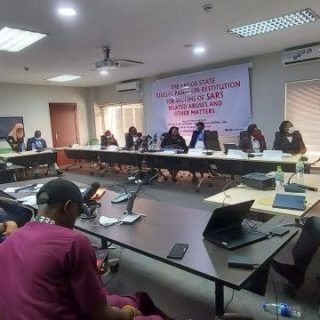Citizen is a column that explains how the government’s policies fucks citizens and how we can unfuck ourselves.
The Nigerian police is ranked as one of the worst in the world, and the Nigerian society is notable for widespread human rights abuses. In your house or outside it, you’re always a moment away from having your rights abused by the police in Nigeria.
After the #EndSARS protests, the Nigerian police have ramped up arrests of people who are perceived to be the arrowheads of the protests. Typically, the Nigerian police round people up through whatever means necessary and then whisk a person off to a far-away place where they have no access to their friends, family or lawyer.
Here, we explain the relevant law in criminal administration in Nigeria, the Administration of Criminal Justice Act (2015), and the important things the Nigerian police should do when they arrest you or want to have you arrested.
Of course, whether the Nigerian police actually does these things is another matter entirely.
You:
Nigerian police:
Here are 11 rights the Nigerian police must consider when they have you arrested as enshrined in the law :
1) Use of handcuffs
You cannot be handcuffed unless you have attempted to escape or it is necessary to handcuff you for your safety, or by an order of the court. (Section 5)
2) Notification of arrest
The police officer or anyone making the arrest must notify you of the reason for your arrest, except you were arrested while committing an offence, after committing an offence or after you escaped from a police custody. (Section 6 (1).
3) Right to a legal practitioner
The police officer making the arrest or the police officer in charge of a police station must inform you of your right to remain silent or to avoid answering any question until after you meet a legal practitioner or anyone of your choice.
They must also inform you of your right to consult a legal practitioner before making, endorsing or writing any statement or answering any question that has been put to you.
They must also notify you of free legal representation by the Legal Aid Council of Nigeria, in the case where you are unable to afford a lawyer.
Also, the police or security authorities who are in charge of the custody where you have been arrested must notify your next of kin or relative of your arrest, and you don’t have to pay anything for this service. Section 6 (2).
4) Arresting another person
Nobody can be arrested in place of another suspect.
This means that the police cannot arrest your friend or family member cannot be arrested in your place. (Section 7).
5) Treatment with dignity
You must be treated with dignity and humanely while in the custody of the police or whoever has arrested you. Section 8 (1)
This means that you must be treated with respect as a human being, and not as a slave or a property.
6) Arrest for a civil wrong
You cannot be arrested by the police for a civil wrong or a breach of contract. Section 8 (2).
A civil wrong is something that you have done to someone else that affects their rights, like noise pollution.
A breach of contract is when you fail to fulfill your end of a bargain with another person.
7) Arraignment or release
You must be brought to court in accordance with the provisions of the law or be released conditionally or unconditionally. Section 8 (3).
8) Search of an arrested suspect
In the case that you have been arrested, whoever is arresting you may search you using the force that is necessary, but the person must safely keep all the properties found on you, except the clothes you’re wearing. (Section 9).
The search must also be conducted decently, and it must be done by a person who is of the same sex as you, except where it is urgent to conduct the search and a person of your gender is not around.
9. An inventory of everything recovered from you
Once you have been arrested and the items on you have been taken away by the police, the police must record everything taken away from you in an inventory, and the inventory is not invalidated even if you fail to sign it.
You can direct that your lawyer or any other person should be given a copy of the inventory, and the police can release your properties to you before you are charged to court.
The police must also return all your properties to you once they have found that you are not guilty of the offence you were being charged for. (Section 10)
10. You can only be arrested without a warrant where:
- a police officer suspects strongly that you have committed an offence against the laws of Nigeria or against the laws of another country.
- the offence was committed right in the presence of the police officer.
- you have obstructed a police officer in the conduct of his duty, or you have attempted to escape or have escaped from custody.
- a stolen property is found on you or a property that may appear as if it was stolen was found on you.
- a police officer suspects that you ran away as a deserter from one of the armed forces in Nigeria.
- if a police officer suspects that you have committed a crime outside Nigeria that warrants that you are arrested in Nigeria.
- you are in a situation where you have to prove that you did not break into a house, steal a car or be in possession of any dangerous weapon.
- the police officer believes that a court has issued a warrant for your arrest.
- the police officer believes that you are hiding your identity because you want to commit an offence.
- your warrant of arrest has been issued, or a Judge, Magistrate or a superior police officer has directed the police officer to arrest you.
- the police officer believes that you are trying to commit an offence and arresting you without warrant is necessary to prevent you from committing the offence. (Section 18)
11) Notification of offence and access to communication
Once you have been arrested, with or without a warrant, the police must take you to a police station and inform you of your crime in the language that you understand.
The police must also give you reasonable time to obtain legal advice, to communicate with your family and friends on how you can meet the bail conditions and how you can make arrangements for your defence or release. (Section 14)
12) Recording of arrests
Within 48 hours of your arrest, whether you have been been arrested with or without a warrant, the police or any other security agency arresting you must take a record of your:
- alleged offence;
- the date and circumstance of the arrest;
- your full name, occupation and residential address;
- your identification records, which includes your height, your photograph, your full fingerprint impressions, and any other means of identifying you. (Section 15).
These are just some of the things you must know when the police arrest you. It is important that the police treat you with care and follow the law as you remain innocent until a court of law has proven that you are guilty. Hence, your rights must not be trampled upon.
For more on the Administration of Criminal Justice Act (2015) and how criminal processes should be embarked upon in Nigeria, read here.
We hope you’ve learned a thing or two about how to unfuck yourself when the Nigerian government moves mad. Check back every weekday for more Zikoko Citizen explainers.
COMPONENT NOT FOUND: donation




